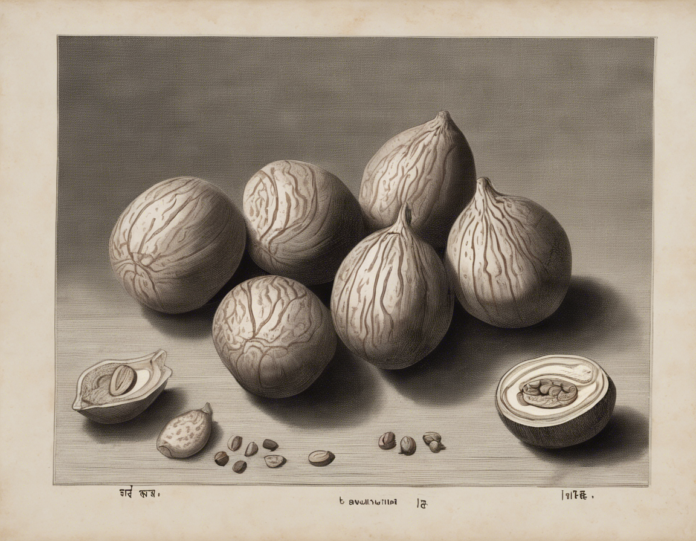Nutmeg is a versatile spice that is commonly used in various cuisines across the globe. Known for its unique flavor profile and aromatic properties, nutmeg is a staple ingredient in both sweet and savory dishes. In Hindi, nutmeg is known as “Jaiphal” or “सुती” and is widely used in traditional Indian cooking for its medicinal properties and distinct taste. In this comprehensive guide, we will delve into the world of nutmeg, exploring its origins, uses, health benefits, and much more.
Nutmeg: An Overview
Nutmeg is derived from the seed of the nutmeg tree, which is native to the Banda Islands in Indonesia. The tree, scientifically known as Myristica fragrans, produces both nutmeg and mace – two valuable spices that have been highly prized for their culinary and medicinal properties for centuries. The nutmeg seed is oval-shaped and approximately one inch long, with a brown, wrinkled surface. When grated or ground, nutmeg releases a warm, sweet, and nutty aroma that adds depth and complexity to dishes.
Nutmeg Varieties
There are two main varieties of nutmeg: whole nutmeg and ground nutmeg.
- Whole Nutmeg: Whole nutmeg is the seed itself, which can be grated using a nutmeg grater or a fine grater. This method ensures maximum freshness and flavor.
- Ground Nutmeg: Ground nutmeg is the powdered form of the seed and is more convenient for everyday use. However, ground nutmeg tends to lose its flavor and aroma quicker than whole nutmeg.
Culinary Uses of Nutmeg
Nutmeg is a versatile spice that features prominently in both sweet and savory dishes. In Indian cuisine, nutmeg is often used in desserts, beverages, meat dishes, and vegetable curries to enhance flavor profiles. Some popular dishes that incorporate nutmeg include:
- Garam Masala: Nutmeg is a key ingredient in the Indian spice blend, Garam Masala. It adds warmth and depth to dishes like biryani, curries, and kebabs.
- Desserts: Nutmeg is a common addition to desserts like rice pudding, carrot halwa, and kheer, imparting a rich and aromatic flavor.
- Beverages: Nutmeg is used in traditional Indian beverages such as chai and thandai to elevate the taste and aroma.
In addition to Indian cuisine, nutmeg is also used in Western dishes like pumpkin pie, eggnog, and béchamel sauce. Its subtle yet distinctive flavor makes it a versatile spice for both sweet and savory recipes.
Health Benefits of Nutmeg
Beyond its culinary uses, nutmeg offers a range of potential health benefits when consumed in moderation. Some of the key health benefits of nutmeg include:
- Digestive Aid: Nutmeg is known to aid in digestion and relieve gastrointestinal discomfort. It can help reduce bloating, gas, and indigestion.
- Anti-inflammatory Properties: Nutmeg contains compounds that possess anti-inflammatory properties, which may help reduce inflammation in the body.
- Brain Health: Nutmeg is believed to have cognitive benefits and may help improve memory and cognitive function.
- Sleep Aid: Nutmeg is often used as a natural sleep aid due to its calming and sedative properties. It can help promote relaxation and alleviate sleep disturbances.
While nutmeg can offer health benefits, it is essential to consume it in moderation, as excessive intake can have adverse effects. Overconsumption of nutmeg is not recommended, as it may lead to toxicity and side effects.
Nutmeg in Ayurveda and Traditional Medicine
In Ayurveda, the ancient Indian system of medicine, nutmeg has been used for its medicinal properties for centuries. According to Ayurvedic principles, nutmeg is believed to balance the Vata and Kapha doshas, making it suitable for individuals with imbalances related to these doshas. Some traditional uses of nutmeg in Ayurveda include:
- Digestive Aid: Nutmeg is thought to stimulate digestion and improve appetite. It is often recommended for individuals with digestive issues or poor digestion.
- Pain Relief: Nutmeg is used topically or internally to alleviate pain, especially in conditions like arthritis and muscle aches.
- Respiratory Health: Nutmeg is believed to have respiratory benefits and may help alleviate symptoms of coughs, colds, and respiratory infections.
In traditional medicine practices across various cultures, nutmeg is also used for its analgesic, antibacterial, and anti-inflammatory properties. It is essential to consult a healthcare professional before using nutmeg for medicinal purposes, especially in higher doses.
Cooking Tips and Tricks for Using Nutmeg
When incorporating nutmeg into your cooking, it is essential to follow some tips to maximize its flavor and aroma:
- Use freshly grated nutmeg for the best flavor. Whole nutmeg can be grated using a nutmeg grater or a fine grater just before use.
- Add nutmeg towards the end of the cooking process to preserve its delicate flavor. Heating nutmeg for too long can cause it to lose its aroma.
- Experiment with small amounts of nutmeg in your recipes and adjust according to your taste preferences. Nutmeg has a strong flavor, so a little goes a long way.
By following these tips, you can make the most of nutmeg’s unique flavor profile and enhance the taste of your dishes.
Frequently Asked Questions (FAQs) About Nutmeg:
Q1: What are the potential side effects of consuming too much nutmeg?
A: Consuming excessive amounts of nutmeg can cause symptoms like nausea, dizziness, dry mouth, and hallucinations. It is crucial to use nutmeg in moderation to avoid adverse effects.
Q2: Can nutmeg be used as a substitute for mace in recipes?
A: Yes, nutmeg and mace come from the same plant and have similar flavor profiles. Nutmeg can be used as a substitute for mace in recipes, although the intensity of flavor may vary slightly.
Q3: Is nutmeg safe for pregnant women to consume?
A: Pregnant women should consume nutmeg in moderation, as excessive intake may have adverse effects. It is advisable to consult a healthcare provider before including nutmeg in your diet during pregnancy.
Q4: How should nutmeg be stored to maintain its freshness?
A: Whole nutmeg should be stored in an airtight container in a cool, dry place away from sunlight. Ground nutmeg should be stored in a tightly sealed container in a dark, cool cupboard.
Q5: Can nutmeg be used in savory dishes as well as desserts?
A: Yes, nutmeg is a versatile spice that can be used in both sweet and savory dishes. It adds depth of flavor to dishes like soups, stews, and meat-based recipes.
Q6: Is nutmeg gluten-free?
A: Yes, nutmeg is naturally gluten-free and can be safely consumed by individuals with gluten sensitivities or celiac disease.
Q7: How can nutmeg be used in skincare?
A: Nutmeg has antibacterial and anti-inflammatory properties that may benefit the skin. It can be used in homemade face masks or scrubs to help improve skin texture and tone.
Q8: Can nutmeg be used as a natural remedy for toothaches?
A: Nutmeg contains eugenol, a compound with mild analgesic properties. When applied topically to the gums, nutmeg may help alleviate toothache pain temporarily.
Q9: What is the best way to incorporate nutmeg into beverages like coffee or hot chocolate?
A: Nutmeg can be sprinkled on top of beverages like coffee or hot chocolate as a garnish. It adds a warm, aromatic flavor that complements the drinks well.
Q10: Are there any culinary traditions or festivals where nutmeg plays a significant role?
A: Nutmeg is often used in traditional Christmas dishes like eggnog and mulled wine in Western culinary traditions. In Indian cuisine, nutmeg is a common ingredient in festive sweets and drinks during Diwali and other celebrations.
By incorporating nutmeg into your cooking and exploring its diverse uses, you can unlock new flavors and aromas that elevate your dishes to a whole new level. Whether you are a seasoned chef or an enthusiastic home cook, nutmeg is a spice that adds warmth, depth, and complexity to a wide range of culinary creations. Experiment with nutmeg in your favorite recipes and discover the magic of this beloved spice in your kitchen.









